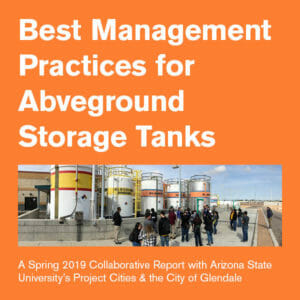The City of Glendale manages approximately 135 Aboveground Storage Tanks (ASTs). ASTs are necessary components for storing valuable chemical agents for a variety of uses, from water treatment to backup power generation. ASTs must be appropriately maintained to ensure citizen and employee safety, and while there are existing standards and regulations, Glendale experts describe a lack of cohesive standards in the industry. Students in Albert Brown’s ERM 401/501 and EGR 427: Hazardous Waste Management spent their Spring 2019 semester researching AST regulations and standards with the goals of identifying AST best management practices and developing an efficient and effective operations and maintenance program for Glendale to consider applying to their ASTs.
This summary report is unique, as it represents the combined effort of a hybrid, multi-campus course format that brought together ASU students from the Tempe campus, Polytechnic campus, as well as online students simultaneously in a quasi-virtual learning environment. To conduct their research, students attended workshops, conducted site visits, performed literature reviews, and held stakeholder interviews with Glendale representatives. Analysis of the gathered information led to a robust list of both specific and generalizable recommendations, aimed at ensuring maximum safety levels for Glendale’s ASTs and the city staff maintaining them.
All the students’ hard work is now available online. Read the full summary report here.
About the summary report
With the help of ASU students and Project Cities, Glendale sought to ensure their AST standards and practices are safe for workers, citizens, and the environment. Students worked in three groups separated by “campus,” each addressing one of three topics: Regulations and standards, Benchmarking case studies, and Diesel fuel tank management. Throughout the process, students looked at existing AST standards and comparable management programs that could potentially apply to Glendale, all while factoring in the City’s own inventory, budget, and the local desert climate to create a customized set of recommendations.
Regulations and standards for aboveground storage tanks
This group researched current AST programs and regulations, namely the Clean Water Act Spill Protection Control and Countermeasure and Resource Conservation and Recovery Act. These regulations set the standard for AST management but do not include all types of ASTs, leaving room for uncertainty. Glendale currently has tanks that fall in this “lack of regulations” zone, yet still need appropriately managed. To address this problem, students investigated professional AST standards from other organizations and inspection protocols from the Steel Tank Institute and the American Petroleum Institute. Student recommendations from this group featured updates to permit conditions, tank operation and maintenance plans, and inspection requirements.
Benchmarking Case Studies
This group researched AST best practices from a variety of organizations to provide Glendale with a baseline of regulatory compliance and operations and maintenance planning. Students divided the work into three major areas to investigate: cities and tribal governments, the commercial sector, and transportation carriers. Organizations ranged from Boeing to U-Haul to the US Air Force, alongside many more. From their findings, this group created a list of general AST best practices as well as a list of Glendale-specific recommendations. Students also drafted an original Standard Operating Procedure, Inspection Checklist, and Inspection Log for the City of Glendale to consider using.
Fuel Tank Program
This group addressed the need for a plan to keep city backup generators reliable and adequately fueled. Through their research, applicable requirements were identified for fuel ASTs, along with industry practices and standards. Students took careful consideration of the extreme heat we experience in Arizona, as well as the fact that backup fuel may not be used for years. These factors led students to explore storage alternatives that could impact fuel longevity. Their subsequent recommendations covered inspection schedules and standards, waste removal, record-keeping, fuel replacement, and more.
